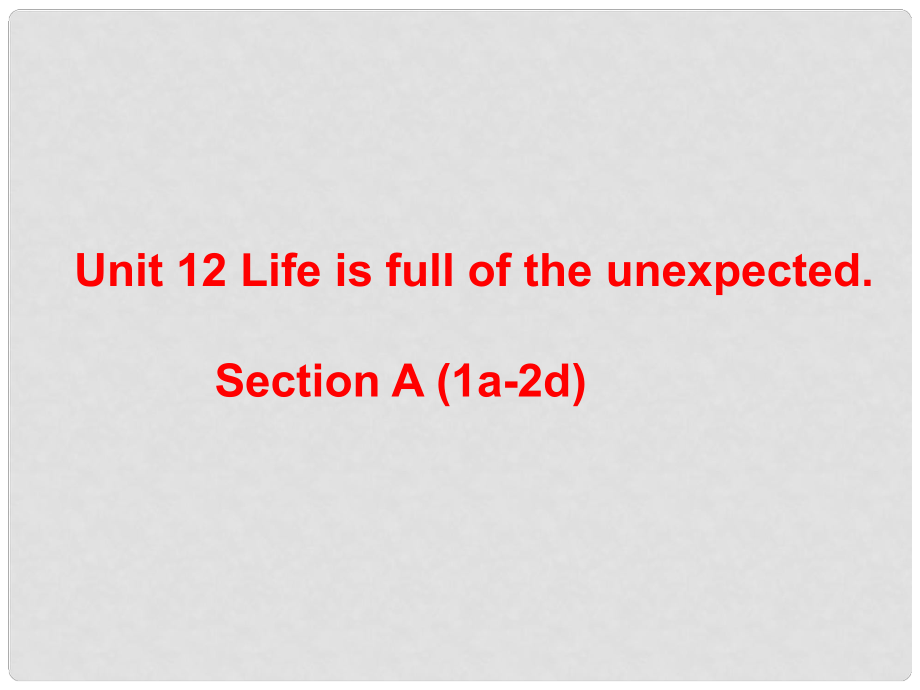《山東省滕州市滕西中學(xué)九年級(jí)英語全冊(cè) Unit 12 Life is full of the unexpected Section A(1a2d)課件 (新版)人教新目標(biāo)版》由會(huì)員分享�,可在線閱讀,更多相關(guān)《山東省滕州市滕西中學(xué)九年級(jí)英語全冊(cè) Unit 12 Life is full of the unexpected Section A(1a2d)課件 (新版)人教新目標(biāo)版(21頁珍藏版)》請(qǐng)?jiān)谘b配圖網(wǎng)上搜索����。
1、Unit 12 Life is full of the unexpected. Section A (1a-2d)Warming up 本課出現(xiàn)的主要?jiǎng)釉~的過去式和過去分詞本課出現(xiàn)的主要?jiǎng)釉~的過去式和過去分詞sleep get goleavering betakerunwake原形原形過去式過去式過去分詞過去分詞slept sleptgot gottengotwent goneleft leftrang rung was/were beentook takenran runwoke wokenHave you ever been late for school? By the time the
2�、 boy got to school, the bell had rung. Have you ever done some good deeds(好事)好事)? By the time the mother came back home, her son had cleaned up the yard.By the time she got up, her brother had already gotten in the shower.By the time she got outside, the bus had already leftWhen she got to school, s
3、he realized she had left her backpack at home.LISTENING (1B: P76) 1. By the time I got up, my brother _already _ in the shower. hadgotten2. By the time I got outside, the bus _ already _. hadleft 3. When I got to school, I realized I _ _ my backpack at home.had left12341.When I (get home), I (realiz
4�����、e) I (leave) my keys in the backpack.2.By the time I (get) back to school, the bell (ring).3.By the time I (walk) into class, the teacher (start) teaching already.got homegothad rungwalkedhad startedrealizedhad leftTHE PAST PERFECT TENSE過去完成時(shí)1.過去完成時(shí)的構(gòu)成助動(dòng)詞 had (用于各種人稱和數(shù)) + 過去分詞When I got to school, t
5�����、he bell had rung.2. 過去完成時(shí)的用法:主要是表示在過去某個(gè)時(shí)間,或是動(dòng)作之前已經(jīng)發(fā)生或完成的動(dòng)作.也就是過去的過去過去的過去. 過去的過去過去的過去 過去過去 現(xiàn)在現(xiàn)在 構(gòu)成:構(gòu)成:had過去分詞過去分詞過去完成時(shí)過去完成時(shí) Exercises:一 根據(jù)漢意完成單詞�。1. I _up late this morning. (醒來)2. Have you ever _? (睡過頭) 3. After I got to the cinema, the film _already. (開始)4.He _(完成) his homework before I came here.5.By the end of last year, she_ (學(xué))to swim for 3 years.二二 翻譯下列句子�。翻譯下列句子����。1 在我走進(jìn)教室時(shí),老師已經(jīng)開始講課了�。在我走進(jìn)教室時(shí),老師已經(jīng)開始講課了����。 _2 當(dāng)我到達(dá)學(xué)校的時(shí)候����,我才意識(shí)到我把書包忘當(dāng)我到達(dá)學(xué)校的時(shí)候,我才意識(shí)到我把書包忘 家里了�����。家里了���。 _3 當(dāng)我起來時(shí)��,我的哥哥已經(jīng)進(jìn)去洗澡了�。當(dāng)我起來時(shí)��,我的哥哥已經(jīng)進(jìn)去洗澡了。 _4 早上上學(xué)之前���,你通常做些什么�����?早上上學(xué)之前��,你通常做些什么�����? _
 山東省滕州市滕西中學(xué)九年級(jí)英語全冊(cè) Unit 12 Life is full of the unexpected Section A(1a2d)課件 (新版)人教新目標(biāo)版
山東省滕州市滕西中學(xué)九年級(jí)英語全冊(cè) Unit 12 Life is full of the unexpected Section A(1a2d)課件 (新版)人教新目標(biāo)版

